

Dignissime D[omi]ne Francisce Pariz Papai,
Prosperus iter facias,
Per varios casus per sat discrimina;
sic Illustrissimo hujus libri possessori precatur,
ultimus in Eulogijs, sed non ultimus in votis;
Joh[ann]es Covel. S. T. P. Collegij Christi Custos. Cantabrigiae.
Anno Aetat[is] 79º currente, MDCCXVIº Sept. XXIV.
|
* Xenophon, Agesilaus 11.14. (in
the original, correctly: “gêraskei”).
|
|
|
Albeit the forces of body decrease with old age, but the strength
of the spirit of the righteous can never grow old. *
Truly worthy Ferenc Pápai Páriz
Go with prosperous fortune on your way,
in every situation, through every vicissitude:
this I wish to the illustrious owner of this album,
the last among those who write their mementos,
but not the last as to the good wishes:
John Covell, custos of
Christ’s College in Cambridge
in the 79th year of his life, on
September 24, 1716
|
p.
476. Cambridge, October 5, 1716
Covell, John
(1638-1722), English pastor and
traveller
John Covell (Covel,
Colvill) was born on April 2, 1638. From 1658 he studied in Christ’s College
in Cambridge, then he became a fellow of the college. In 1661 he
graduated M.A. He was primarily interested in natural sciences,
and learned physics and botany. In 1669 he was a chaplain of the
Levant Company, and served with the embassadors sent to the Porte.
At the end of 1670 he went to Constantinople. Seven years later he
resigned, travelled to Izmit (Nicomedia) and Iznik (Nicea),
then sailed to Venice and made a tour of Italian towns. His
diaries, drawings and maps, as well as the manuscripts and books
collected by him got to the British Museum. He was also officially
called upon to examine the standpoint of the Greek church in the
doctrine of transsubstantiation. After returning to his college,
he received the degree of doctor of theology (D.D.) with royal
permission (lit. reg.). In 1680 he became a sinecure rector in
Littlebury (Essex), then in 1681 chaplain of the Princess of
Oranien in the Hague. When however in October 1685 he described to
the English embassador how tyrannically the Prince (the later
William III, King of England and Ireland, 1688-1702) treats his
wife, his letter was caught by the Prince, and he had to leave the
country within three hours. In 1687 he received the title of
Chancellor of York. In 1688 he was elected rector of Christ’s College
in Cambridge, and he was a popular director. He died on December
19, 1722. His work is:
Some account of the present Greek Church, with reflections on
their present doctrine and discipline, particularly on the
eucharist and the rest of their seven pretended sacraments …
Cambridge, 1722. – Voyages en Turquie 1675-1677, …
traduit par Jean-Pierre Grélois. Paris, 1998.
John Covell was 79 years old when writing in the album of Pápai Páriz. Covell
had been contacted in Cambridge also by András Ajtai Szabó
(p. 451), as we know from his letter to
Covell written in London on March 6, 1716. [Gömöri: Adalékok]
•
DNB • Jöcher-Adelung |

